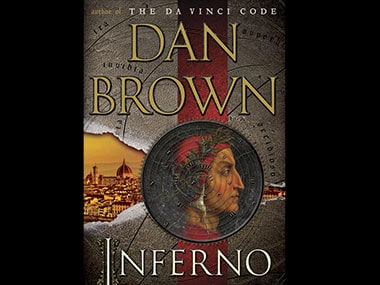Dan Brown’s Inferno borrows its title from the first part of Dante Alighieri’s 14th century poem Divine Comedy. Inferno means ‘hell’ in Italian and is part one of Divine Comedy. The section is followed by Purgatorio (Purgatory) and Paradiso (Paradise). While Dante’s Inferno is a classic, Brown’s Inferno has a plot that seems contrived at best. Inferno brings back Harvard symbologist Robert Langdon, the main character in the bestselling novels, The Da Vinci Code and Angels and Demons. This time he’s in Florence and he has lost his memory. What he does have, however, is a secret object hidden in his tweed jacket and a threat upon his life. Langdon meets the young Doctor Sienna Brooks who starts helping him while being chased by an unknown dangerous organisation. Of course, like all Dan Brown novels this dangerous organisation has remained super secret for years. However, once you realise what the group does, the thought bubble over your head would probably read “Lame”. This has to be the most disappointing secret organisation ever. The fate of the world rests on Langdon and Brooks because a mad scientist is trying to reintroduce the Black Plague upon the planet once again. Langdon and Sienna must find the so-called deadly virus created by the scientist and stop the world from a medical catastrophe. Does Langdon succeed? Well, sort of but not really. Does Dan Brown destroy the human race in his book? Well, sort of but not really. Enough said. [caption id=“attachment_812955” align=“alignleft” width=“380”]  The cover of Dan Brown’s Inferno. Associated Press[/caption] How does Dante fit into all of this? Well, the mad scientist loves his Dante and his idea for world destruction comes from Dante’s Divine Comedy, which emphasised that in order to reach Paradise, man must go through Inferno and then Purgatory. He leaves clues to locate the virus and Langdon and Brooks must decode them to get to the virus. Of course the codes have a generous amount of Dante sprinkled on them. Brown’s story unveils in a non-linear fashion. Since Langdon is suffering from short term amnesia, he spends a good part of the novel trying to reconstruct his memory. Meanwhile, the plot goes through various twists and turns and by the time Landon remembers everything, you’ve got detailed description of every single lecture he’s ever given on Dante and other works of art. It gets taxing when all you want to know is where the novel is headed. When you do eventually get to the end of the book, you can’t help feeling like Dan Brown chickened out. The end does seem incredible (surprise, surprise) and out of a science-fiction thriller, but it’s far too convenient for everyone (particularly the human race). Incidentally, the scientist is also convinced that the humans have been breeding like bunny rabbits and that in order for the human race to survive, we need mass culling. Population control and genetics are a central theme in the novel and it gets tedious to keep reading about how our world will collapse if we don’t stop reproducing. While you may ultimately appreciate and forgive the repeated references to Dante, what I found particularly irksome is Brown’s determined descriptions of every single thing in Italy since Brown is not particularly good at those. Boring details of piazzas are the last thing you want to read when the book is meant to be a thriller. Take this description of St Mark’s Church in Venice. Brown writes, “Robert had visited many magnificent cathedrals in his life, but the ambience of St Mark’s Chiesa d’Oro always struck him as truly singular_."_ Incidentally, Chiesa d’Oro means “church of gold” and Langdon is properly gold-struck at the sight of it. Great. Then Brown takes Langdon to Istanbul and starts waxing on about the gold at the Hagia Sophia. Again. I admit, I skimmed over those glorious, amazing and splendid details of each and every church, mosque, building, art work. “Seek and ye shall find”, is one line repeated in Inferno. Which raises expectations of what you will find for all that seeking. Unfortunately, by the end, Inferno just leaves you wondering whether Dan Brown isn’t trying just a little too hard.
“Seek and ye shall find”, is one line repeated in Inferno. Which raises expectations of what you will find for all that seeking. Unfortunately, by the end, Inferno just leaves you wondering whether Dan Brown isn’t trying just a little too hard.
Advertisement
End of Article


)
)
)
)
)
)
)
)
)



